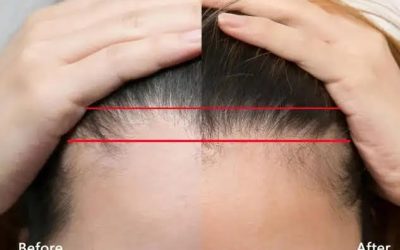Nizoral is the most popular brand of shampoo, an anti-fungal which treats scalp conditions like dandruff and psoriasis.
Dandruff is commonly caused by seborrheic dermatitis, a scalp problem associated with the fungus Malassezia. Nizoral shampoo treats dandruff by killing the fungi and reducing scalp inflammation.
While Nizoral and other similar shampoos are being marketed as anti-dandruff products, they have also been linked to hair growth.
There are claims that these products can help those with androgenetic alopecia, popularly known as male pattern baldness and female pattern hair loss, and other types of alopecia.
But is there any truth to this claim? Can Nizoral shampoo really help bring back your precious locks?
Nizoral Shampoo & Hair Loss – What Is the Link?
Studies were conducted to check if there is any link between Nizoral or other similar shampoos and hair loss. To be more specific, the research was focused on determining if these products promote hair growth.
While the sample sizes for the studies conducted were small, results indicated that the use of this type of shampoo increased the number and size of hair follicles. These are the same effects observed in some clinically proven hair growth medications.
However, these effects did not happen instantly. According to researchers, it may take several weeks or months of continued use before the condition improves.
The results of research on Nizoral for hair regrowth are promising, but there are also a few studies which had different findings – these shampoos can cause hair loss.
Aside from losing hair, those who use these products may also experience scalp irritation, scalp dryness and change in hair texture. Researchers noted, however, that hair loss due to the use of these shampoos is very rare.
Proven Treatments for Hair Loss
Despite the promising findings on Nizoral and other similar shampoos in treating hair loss, more studies are needed to determine its true efficacy.
Given the claims that they can also lead to hair loss, it is best to use these products for dandruff problems and not for hair regrowth.
If you are losing too much hair, the smart move is to consult a trichologist or dermatologist to get proper treatment for your alopecia.
There are a couple of medications proven to stop hair loss and promote hair regrowth. One is a pill that is taken daily while the other is a topical medication that is applied on the affected area.
Apart from these clinically proven medications, hair and scalp specialists also prescribe supplements to address any nutritional deficiency that may be causing or contributing to the hair loss.
Keep in mind, the key to effectively treating hair loss is to identify and treat the underlying cause. So, if you are losing your hair due to a thyroid problem, the treatment is going to involve medications to correct the underlying health issue.
Meanwhile, there are also cases which do not require treatment. If the cause of your hair loss is telogen effluvium, taking medications is usually not necessary unless it is already severe. Oftentimes, this problem gets resolved on its own or when the cause is eliminated.
Laser treatment is another approach. In this treatment, the goal is to lessen the inflammation in the scalp which prevents the hair follicles from growing back. Hair transplant is also used to treat hair loss but only for severe or irreversible cases.
In conclusion, emerging research shows that Nizoral and other similar shampoos can promote hair growth. However, more studies should be done to determine if these products are effective and safe.
So, do not use these shampoos to regrow your hair. What you should do instead is to consult a specialist to find out what the best treatment plan is for your hair loss.
Are you suffering from hair loss? Early treatment leads to better results. Schedule an appointment with our trichologist. Call us now on +353 (0)1 6793618!



